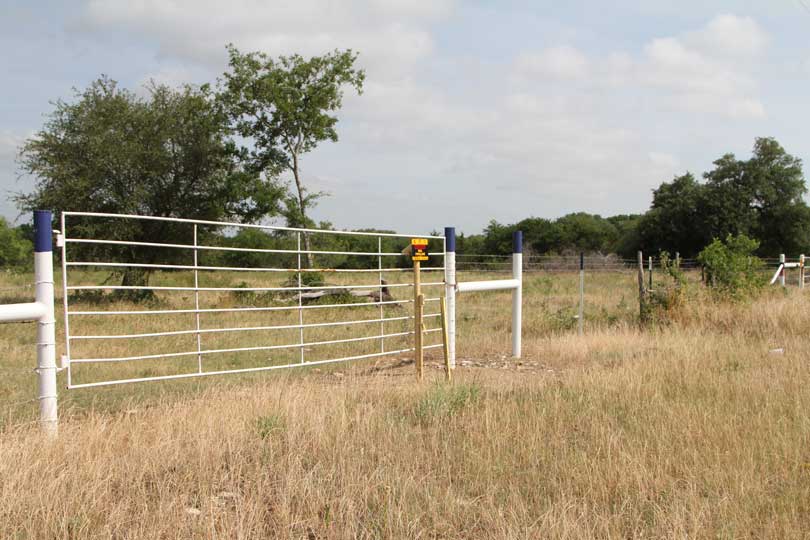By Julie Tomascik
Editor
About 95 percent of the land in Texas is privately owned, and it’s a prime target in a state with a strong appetite for new development.
That often leaves landowners facing a tough battle when eminent domain proceedings are brought to their front door.
But a coalition of agricultural and landowner organizations, Texans for Property Rights, is once again working for eminent domain reform in the upcoming legislative session.
Texas Farm Bureau (TFB), Texas and Southwestern Cattle Raisers Association, Texas Wildlife Association and other industry groups believe in protecting private property rights of Texans against abusive practices, particularly by private corporations who use the government sponsored power of eminent domain.
We want to create a unified voice for Texas property owners and demand the Legislature reform eminent domain in our state,” Marissa Patton, TFB associate legislative director, said. “Private property owners deserve fairness, respect and transparency when faced with the prospect of potential condemnation by entities needing land for a public project.”
Texans for Property Rights recently launched a new website. The coalition is asking landowners to share their experiences dealing with lowball offers, fighting for fair compensation and fair terms.
“We can use those stories, those experiences to help build a case for eminent domain reform in Texas,” Patton said. “Landowners must also share their stories with their state representatives and state senators.”
TFB, along with other organizations, worked for reform in 2017, but were unsuccessful.
Under current law, there is no mechanism preventing entities from giving lowball offers to landowners.
“The general sentiment is that landowners should reach a voluntarily settlement deal prior to the entity having to exercise condemnation. Typically, landowners want this, too,” Patton said. “However, Texas statute gives landowners very little leverage within the negotiation process to entice a fair deal from the entity seeking their property. Eventually, if the landowner remains unconvinced that the offer is fair, their only choice is to settle or be sued.”
A level playing field is needed, Patton said. And baseline property protections should be a given and not used as a bargaining chip in negotiations.
“When landowners are forced to give up ownership of their property for the sake of public good, their rights should be firmly protected,” she said. “Our laws should advocate the most fair process possible when it comes to the taking of private property. Landowners are partners in all of this, and it’s time they begin being treated that way.”
Contact Patton at mpatton@txfb.org or 512-472-8288 with questions or comments regarding eminent domain proceedings and reform efforts.


Five to seven years ago an oil company installed an oil pipeline thru my south pasture with is about 40 yards from my home. They paid me & other members of my family for their line coming thru our ranch, but there was no way to stop them.
E. Harris
Waller Co. Texas
Eminent Domain is vastly outdated, misused and very unjust to many, especially farmers, ranchers and especially rural retired persons. No way should the currently proposed High Speed Train from Houston to Dallas be allowed to qualify for use of Eminent Domain for Japanese financing of this venture. We need the Texas Farm Bureau to speak out against the Bullet Train as this will impact farmers and ranchers for the rest of their lives. Where is our help when we need it for those taking our land.
When BIG private for profit oil, gas and wind corporations can be designated as Public Utilities, private land owners rights get severely diminished. It’s not only these uninvited land thieves at fault, it’s also our crooked politicians. As land owners we have to fight like hell for our rights all the way to the court house. These thieves will threaten and try to bully you with lawyers, land men and construction superintendents. Stand up for yourselves and fight and don’t make the mistake of believing anything they say. Hire good attorneys to read and amend contracts. Negotiate for yourself and for the protection of your property. I know because I have to deal with these lecherous thieves on my ranch in Erath County every year. It’s a shame and should be a criminal
A pipe line company is now replacing a line that was laid in 1952 with an easement written and sighed then that states that damages are paid on growing crops and fences. The men of our community signed these easements in good faith because they believed in people and honesty. They are now running over the land owners and tenets,the easements were not specific as to an area but to the whole farm. They will not talk to us. I found out about it when I showed up to cut a hay field and two dozers were sitting in the field. What they are doing to our land and the environment is terrible.